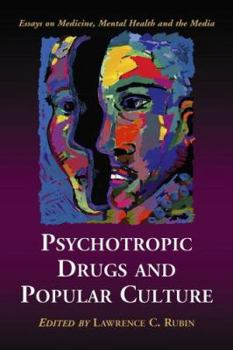Psychotropic Drugs and Popular Culture: Essays on Medicine, Mental Health and the Media
Psychotropic drugs--those intended to change moods, numb anxiety, calm children--are pervasive in American culture. References are everywhere: not just in print and electronic advertisements but in television show dialogue, movies, song lyrics, and on advertising paraphernalia like notepads, wall clocks, mouse pads, coffee mugs, pens and pencils. The authors in this compilation of essays on psychotropic drugs and mass culture contend that society has been transformed into an asylum without walls--a "psychotropia." With each new definition of a mental ailment, a new cure is offered, increasing the number of inmates in this borderless asylum and blurring the lines between mental health and mental illness.
Eight essays probe this issue, with an introduction and conclusion by the editor. The introduction frames the topic in the dehumanized asylums brought to light in 1961 by sociologist Erving Goffman, and in author Marshall McLuhan's warning not to be seduced by the media. Essay topics cover: how psychotropia came to be; drug portrayal in Hollywood; advertising in cyberspace and the postmodern condition; the advertising madness that promotes better living through chemistry; food as medicine; the music culture of psychotropia; children and psychotropic drugs; and stereotypes and manipulation in mass marketing.
Instructors considering this book for use in a course may request an examination copy here.
Related Subjects
Anthropology Education & Reference Reference Social Science Social Sciences Textbooks




